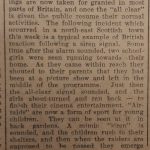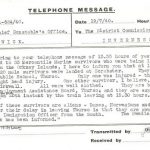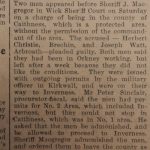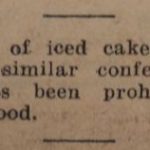On 16 July, Hitler ordered his military forces to prepare for Operation Sea Lion, the planned invasion of Britain. Meanwhile, the German air force continued to engage the RAF over the Channel, attacking convoys and raising coastal towns; on 18 July the Goodwin lightship was sunk. On 18 July Vichy France, in retaliation for the sinking of the French fleet by Britain at Mers-el-Kébir a fortnight before, bombed Gibraltar. And on Sunday 21 July the Czechoslovakian government in exile arrived in Britain.
 After all the serious news of the last couple of weeks, the John o’Groat Journal offered a light-hearted take on attitudes to air raids among the young. It reported that two schoolgirls, on hearing the siren, “were seen running towards their home. As they came within reach they shouted to their parents that they had been at a picture show and left in the middle of the programme. Just then the all-clear signal sounded, and the girls about-turned and ran back – to finish their cinema entertainment.”
After all the serious news of the last couple of weeks, the John o’Groat Journal offered a light-hearted take on attitudes to air raids among the young. It reported that two schoolgirls, on hearing the siren, “were seen running towards their home. As they came within reach they shouted to their parents that they had been at a picture show and left in the middle of the programme. Just then the all-clear signal sounded, and the girls about-turned and ran back – to finish their cinema entertainment.”
Meanwhile, Caithness continued to act as a transit point for merchant seamen of all nationalities whose ships had  been sunk by the Germans. On 19 July the Chief Constable’s office reported that another 20 survivors were landed at Scrabster. “They were taken to the West Public School, Thurso. Only one was injured – the Captain – who had a slight head injury.” The men were “Danes, Norwegians and Swedes”, and as soon as an immigration officer arrived they would be sent south by train.
been sunk by the Germans. On 19 July the Chief Constable’s office reported that another 20 survivors were landed at Scrabster. “They were taken to the West Public School, Thurso. Only one was injured – the Captain – who had a slight head injury.” The men were “Danes, Norwegians and Swedes”, and as soon as an immigration officer arrived they would be sent south by train.
 Two more men were caught out by the designation of the North Highlands as a Protected Area this week. The men – one from Brechin and the other from Arbroath – had been working in Orkney, but “left after a week because they did not like the conditions”. They were making for Inverness, and had permits for there, but not for Caithness, and so had been arrested on arrival on the mainland. The men were “admonished” and told to leave the county as soon as possible.
Two more men were caught out by the designation of the North Highlands as a Protected Area this week. The men – one from Brechin and the other from Arbroath – had been working in Orkney, but “left after a week because they did not like the conditions”. They were making for Inverness, and had permits for there, but not for Caithness, and so had been arrested on arrival on the mainland. The men were “admonished” and told to leave the county as soon as possible.
Finally, one of the severest and most inhumane restrictions of the war so far was announced: “The making of iced cakes, cream buns, eclairs, and similar confectionery after August 5 has been prohibited by the Ministry of Food.” Apparently there had been complaints about the profligate use of sugar by bakers, at a time when the standard ration was eight ounces of sugar per person per week. The Sugar (Restriction of Use) Order, 1940, meant that many couples could no longer celebrate their wedding with a traditional iced cake.
cakes, cream buns, eclairs, and similar confectionery after August 5 has been prohibited by the Ministry of Food.” Apparently there had been complaints about the profligate use of sugar by bakers, at a time when the standard ration was eight ounces of sugar per person per week. The Sugar (Restriction of Use) Order, 1940, meant that many couples could no longer celebrate their wedding with a traditional iced cake.
